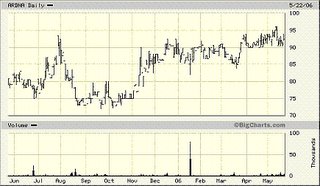
Arden Group Inc., (ARDNA-$92.36) is a real estate holding company that conducts operations through Arden-Mayfair, its wholly owned subsidiary. Arden-Mayfair's other subsidiary, Gelson's Markets, operates eighteen upscale supermarkets in Southern California. According to management, each location is singularly known as the “area's best market for superior produce, highest quality meat, seafood and deli, an unmatched selection of wine and liquor, and exceptional service.”
Arden Group is also the fiefdom of one Bernard Briskin. Controlling beneficial ownership of 59.1% of the Company Stock, he certainly lords it over his subordinates. Herr Briskin is Chairman of the Board of Directors, President and Chief Executive Officer of the Company and its two subsidiaries. The only executive hat not worn by Briskin is that of Chief Financial Officer. Fealty being suspect—two persons have rotated through the office in the last 2 ½ years—and the post has been vacant since July 1, 2005.
For the fiscal year ended December 31, 2005, Bernard Briskin’s total compensation was approximately $1.80 million, consisting of salary of $611,000 and bonus of $1.19 million. Looking at the terms of his employment agreement, the only compensation that seemed extraordinary was that terms of his contract provide for an annual medical expense reimbursement up to $200,000 for Mr. Briskin and his immediate family during each calendar year. Briskin is 81 years of age.
When the only press heralded by the Company (aside from earnings) is “Quarterly Dividend Declared,” it is hard to get excited about the investment potential of the Common Stock. In fact, unless you live in Southern California, you probably have never even heard of Gelsens. Arden Group, with a total market cap of only $298.2 million, is a food-retailing success with no research following on Wall Street. [ed. note. Might it also be due to a paucity of investment banking opportunities?]
Gelson's upscale stores average between 18,000 and 40,000 sq. ft. and carry traditional grocery items, as well as imported foods and unusual deli selections. Most of the stores also feature coffee bars, fresh pizza, and bakeries. Additionally, selected stores offer banking and pharmacy services through third parties.
Store format and corporate strategy is to remain competitive within its market niches, ranging from the more traditional to the more exotic, specialty or high-end retailers. The Company, however, is not seeking to win customer loyalty on price alone. Gelson’s direct advertising is very limited (primarily newsletters and direct mail) and is typically event rather than price oriented, emphasizing, for example, special holiday selections, specialty items and services, recipes and new products. In our opinion, this ad strategy sends a clear, branded message to customers that the Company offers a comfortable upscale shopping experience which is superior to its competitors in terms of customer service and merchandise selection and presentation.
In our opinion, establishing a positive relationship with its customer base augurs well for future sales momentum—customer loyalty can help fend off competitive threats from the likes of Wal-Mart and other super store discounters (which are eying the higher-margin organic food business’ and store locations nearer to Gelson stores).
Sustaining sales momentum is critical in a slow-growing industry like the supermarket business. For example, the distressed food retailer, Albertson’s (ABS-$25.60), put itself up for sale last September, after failing to cope with competition from discount retailers such as Wal-Mart and the increasing fragmentation of the US grocery market.
The biggest swing factor for investors in Arden Group is when will the Company step up and start aggressively expanding storefronts? Same store sales increased 1.8% during the first quarter ended April 1, 2006, compared to the prior year. This means that future growth depends to a significant degree on the Company’s ability to open or acquire new stores in existing and new markets.
Perhaps the Company should rename itself, “The Cheap Gourmet.” In 2005, despite generating operating cash flow of more than $33.0 million, capital expenditures totaled $6,390,000, which included costs of approximately $2,400,000 related to the remodeling and expansion of the Century City store. The balance sheet is in great shape, with Total Debt-to-Equity of approximately 2.0 percent.
In the 3Q:06, the Company should receive an incremental sales boost from the Century City store when a major road improvement project (which has been under construction along Santa Monica Boulevard since March 2003) is completed.
No other significant contributor to top-line growth is visible. In our opinion, corporate could do a better job of leveraging its real-estate acumen to identify new markets capable of supporting store openings. We contend, too, that increasing the number of store locations will also help to spread consumer awareness of the overall chain.
Nonetheless, Wall Street cannot complain about the Company’s use of assets, for The Arden Group boasted a trailing twelve-month ROA of 14.78%, compared to 6.21% and 5.54% for competitors, Kroger Co (KR-$20.13) and Safeway, Inc (SWY-$23.51), respectively.
Arden currently trades at an enterprise value (EV)/ trailing EBITDA value of 6.19 times and a trailing P/E multiple of 15.73 times. Kroger and Safeway sport trailing multiples of 6.53 times, 15.35 times and 7.32 times, 18.48 times, respectively.
Lord Briskin, age 81, is in no rush to change his conservative management style. There is little evidence to support sustainable sales or earnings growth over the next several years. As a result, in the opinion of the 10Q Detective—until Briskin passes the scepter or dies in office—investors should not expect Arden Group’s valuation to support expanding levels. The trailing dividend yield of 1.10% is not high enough to grab the attention of income-conscious investors, too.
No comments:
Post a Comment